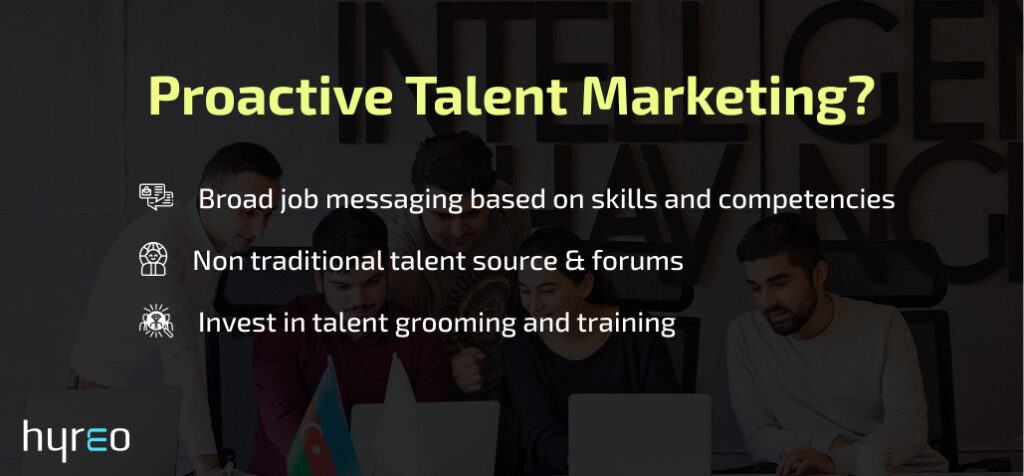“Without the right succession planning to put to play in human resources, we build for the future without a future”
In today’s competitive talent landscape, traditional recruitment methods are no longer sufficient in attracting and retaining top talent.he post-pandemic period and the Great Resignation have intensified the need for effective talent marketing strategies. As businesses struggle to fill key positions, it is crucial to treat recruiting as a marketing endeavor and create compelling campaigns to engage and retain qualified professionals.
With 77% of employers reporting difficulty in filling roles, organizations must understand the fundamentals of Talent Marketing and leverage cutting-edge technological advancements, such as talent management software, to build and maintain dynamic workforces.
Discover the ultimate guide to talent marketing in 2023, delving into key strategies, tools, and best practices to attract and retain top talent in today’s competitive landscape. Gain a competitive edge by understanding the fundamentals, leveraging trends and technologies, and unlocking insights to effectively navigate the post-pandemic era of talent acquisition.

What is Talent/Recruitment Marketing?
Talent marketing involves employing strategies and techniques to attract and nurture the desired talent for an organization, similar to how marketing increases brand awareness and engages customers. Just as marketers analyze target audiences and craft compelling messages, talent marketers tailor their communication to attract individuals with the specific skills and attributes required for various roles. Talent marketing encompasses both internal promotion for current employees and external efforts to attract candidates who may be unaware of the organization’s opportunities.
The implementation of talent marketing can be proactive or reactive. Proactive talent marketing involves creating ongoing campaigns, building relationships with potential candidates, and retaining talent to meet future recruiting needs. Reactive talent marketing, on the other hand, is a response to an immediate opening due to turnover or new assignments.
By using talent marketing strategies, organizations can effectively communicate their employer profile, showcase their company culture, and highlight the unique benefits and opportunities they offer. This enables them to attract, engage and retain top talent, ultimately ensuring a competitive advantage in an ever-evolving job market.
Why Talent Marketing?
Talent marketing has become increasingly important in the modern labor market for several reasons:
#1 Passive job seekers
Many people are not actively looking for new job opportunities, but are open to exploring attractive offers. Talent marketing allows recruiters to actively connect with these passive candidates and highlight their organizational benefits and opportunities. According to LinkedIn research, approximately 70 percent of the global workforce are passive job seekers, which underscores the importance of actively marketing job opportunities to attract their attention.
#2 Address talent shortage
The post-pandemic era has transformed work standards, with the rise of remote and hybrid jobs and significant layoffs in some industries. As a result, finding and attracting the right talent has become increasingly difficult. Talent marketing gives organizations a competitive edge by ensuring their job opportunities stand out and attract top candidates from a limited talent pool.
#3 Targeting Specific Demographics
Traditional jobs are no longer enough for general jobs. To attract top talent, organizations must implement targeted talent marketing strategies that serve specific demographics, especially young talent. This requires understanding their preferences, values and motivations and creating tailored messages that meet their interests and desires.
#4 Build your employer brand and image
Talent marketing is more than just advertising jobs. It focuses on building an employer brand and image that resonates with potential candidates. Today’s job seekers have high expectations and are looking for organizations with a strong culture, a clear mission and an attractive work environment. By effectively marketing these areas of the organization, recruiters can attract talent that aligns with their values and aspirations.
#5 Increasing engagement
In an age of information overload, it’s easy for job seekers to overlook routine communication. Talent marketing involves creating memorable and targeted campaigns that capture the attention of potential candidates. By using innovative strategies, tailored messaging and interactive content, organizations can increase engagement and stand out in a crowded job market.
In summary, talent marketing is essential in today’s competitive environment to overcome the challenges of reaching passive job seekers, talent shortages, targeting specific demographics, building a strong employer brand and increasing engagement. By implementing effective talent marketing strategies, organizations can attract and retain the best talent, ultimately leading to their success in the evolving labor market.
The Stages of Talent/Recruitment Marketing
#1 Awareness/Making a First Impression
The purpose of this stage is to make potential candidates aware of your company and its job opportunities. This is usually achieved through various channels such as company websites, job boards and social media. It is very important to create a positive and compelling first impression that highlights the unique selling points of the organization and captures the attention of candidates.
#2 Interest
Once candidates are aware of the company, the next step is to generate and maintain their interest. This is done by presenting a solid presentation that presents the organization as an attractive employer. Talent marketers must engage candidates with personalized and targeted marketing and provide them with important information about the company’s culture, benefits, growth opportunities and all the other factors that make it an attractive place to work.
#3 Application
At this stage, candidates interested in the company and its opportunities apply for a specific position. Talent marketers must ensure that the application process is smooth and user-friendly, reflecting a positive image of the company run by marketing. Throughout the screening and interview process, all parties involved, including employees, recruiting teams and hiring managers, must maintain a consistent brand image and provide a positive candidate experience.
#4 Selection
Once a candidate has passed the screening and interview, they move to the selection stage. At this stage, it is important to follow up with marketing talent to influence the candidate’s decision-making process. Constant communication and engagement with selected candidates will help keep the company at the forefront of their minds. This can be achieved through personalized follow-up activities that highlight the strengths and unique aspects of the organization and address any concerns or questions.
By following these steps, talent marketers can effectively guide candidates through the hiring process and create a positive and consistent brand experience at every touchpoint. Such a comprehensive approach to talent marketing improves the chances of attracting and securing the organization’s top talent.
Steps for Successful Talent/Recruitment Marketing
Due to the rising demand for competent workers, it is now crucial to use powerful marketing strategies to differentiate yourself from the competition and attract the best prospects. Companies can maximize their efforts, create a strong employer brand, and secure the greatest personnel by understanding the essential steps for effective talent/recruitment marketing.
Consider the following steps for successful talent marketing/recruitment:
#1 Set clear goals
Start by defining your recruiting goals. Decide whether you want to expand your skill set, increase diversity or improve quality of employment. With clear goals, you can adjust your marketing strategies accordingly. For example, if your goal is to attract a larger talent pool, you can focus on expanding your reach through different channels and platforms.
#2 Develop candidate personas
Create detailed personas for your ideal candidates. Consider their demographics, needs, values and preferences. This information guides your marketing efforts, allowing you to tailor your messages and content to the specific interests of your target audience. A deeper understanding of your candidates will help you create engaging and personalized campaigns.
#3 Use diverse channels to connect
Plan how to capture and retain candidates’ attention during the hiring process. Identify the platforms and channels where your target candidates are most active and develop strategies to effectively reach them. This could mean revamping your website content, leveraging your social media platforms, or implementing customized marketing methods to differentiate yourself from your competition.
#4 Showcase your company’s unique advantage
Highlight your company’s unique features and benefits to attract candidates. Clearly state what differentiates your organization from the competition. Emphasize factors such as company culture, career growth opportunities, employee benefits, social impact or innovative projects. Introduce your employer to show why candidates should choose your organization.
#5 Leverage data and metrics
Capture and analyze relevant data and metrics to inform your recruiting efforts. Identify areas where you may be failing or facing challenges. Assess whether aspects of your marketing strategies conflict with your brand or reputation. Use this data to make informed decisions and make changes to optimize your talent marketing.
#6 Effective candidate communication
Connect with candidates through clear, concise and informative communication. If possible, use multiple channels such as email, social media and even personal messages. Keep candidates informed about the hiring process, try to provide timely feedback and respond quickly to all questions. Effective communication helps maintain candidate engagement and portrays your organization as professional and responsive.
Best Practices for Talent/Recruitment Marketing
#1 Maintain recruitment marketing throughout the year
Recruitment marketing should be an ongoing effort, not limited to specific recruitment periods. Even if there are no immediate jobs, constant promotion and advocacy of the employer brand is important. This helps build awareness and attract passive candidates who may be interested in future opportunities. A consistent presentation of the organization’s culture, values and career growth opportunities helps maintain a positive brand image and keeps potential candidates engaged.
#2 Use multiple platforms and social media
In addition to traditional job postings and forums, it’s important to expand your reach using different platforms, including social media. Develop a solid strategy to leverage social media channels such as LinkedIn, Facebook, Twitter and Instagram to attract young and fresh talent. These platforms provide opportunities to showcase your employer brand, share employee stories and experiences, and connect directly with potential candidates. Use targeted advertising and compelling content to capture the attention of your desired audience.
#3 Emphasize non-monetary factors
While monetary compensation is important, it is not the only or primary factor influencing candidates’ decisions. Today, applicants consider many factors when evaluating job opportunities. It is very important to emphasize non-financial aspects such as your organization’s employer brand, policies, work environment, diversity and inclusion initiatives, growth and development opportunities, work-life balance and employee wellness programs. Emphasize these aspects in your talent marketing to attract candidates who fit your company’s culture and values.
By implementing these best practices, organizations can improve their talent/recruitment and attract quality candidates. Consistency in maintaining an employer brand presence, leveraging multiple platforms, including social media, and emphasizing non-financial factors beyond compensation will help create a strong and attractive employer brand. These practices help build a strong talent pipeline and attract candidates who are not only qualified, but also fit the organization’s values and work environment.
Conclusion
Talent/recruitment marketing is a critical strategy for organizations in today’s online brand-centric world. By following the key steps outlined in this guide, organizations can optimize their talent marketing and attract top talent. Setting clear goals allows companies to adjust their marketing strategies and focus on expanding talent, increasing diversity or improving quality of employment. Lead generation helps tailor marketing initiatives to the interests and preferences of your ideal candidates, increasing engagement and engagement.
Keeping the attention of candidates during the recruitment process is crucial and organizations can achieve this by using different platforms, updating website content and using customized marketing techniques. Showing the company’s unique advantages will help differentiate it from competitors and attract candidates. Data and metrics play a critical role in refining talent marketing strategies. Analyzing past performance and identifying areas for improvement allows organizations to make informed decisions and optimize their marketing activities.
Effective communication with candidates is paramount and organizations must maintain clear, concise and informative communication throughout the recruitment process. Using multiple channels and personalized messaging helps create a positive candidate experience and reinforces the organization’s professionalism. In this context, Hyreo is a powerful platform that helps organizations grow their employer brand by providing them customized tools to engage meaningfully with candidates. This streamlines the hiring process, reduces bias and ensures a seamless experience for both candidates and recruiters.
In conclusion, talent marketing is essential for organizations to attract top talent in today’s competitive environment. By implementing the steps described in this guide and implementing solutions like Hyreo, companies can improve their employer brand, effectively hire candidates, simplify recruitment processes and ultimately secure the best talent for their organizations.
Recommended Reads: 12 Recruitment Marketing Strategies for 2023 7 Talent Acquisition Strategies for You [2023] Art of Recruiting: Insights from Top Talent Acquisition Blogs
FAQs on Talent Marketing
What is talent/recruitment marketing?
Talent/recruitment marketing involves employing strategies and techniques to attract and nurture the desired talent for an organization. It focuses on effectively promoting the organization to potential candidates, similar to how marketing increases brand awareness and engages customers.
Why is talent marketing important?
Talent marketing is crucial in overcoming challenges such as reaching passive job seekers, talent shortages, targeting specific demographics, building a strong employer brand, and increasing engagement. It helps organizations attract and retain the best talent, ultimately ensuring success in the evolving labor market.
What are the stages of talent/recruitment marketing?
The stages include Awareness/Making a First Impression, Interest, Application, and Selection. Talent marketers aim to create a positive brand experience at each stage, capturing candidates’ attention, generating interest, facilitating smooth application processes, and maintaining engagement through personalized follow-up.




